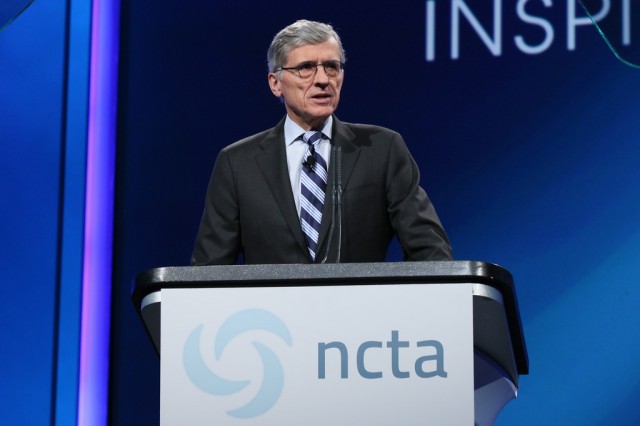
As cable industry lobbyists criticize a Federal Communications Commission plan to inject competition into the set-top box market, FCC Chairman Tom Wheeler today said cable company complaints are off-base.
Since becoming FCC chairman in 2013, Wheeler has repeatedly battled the cable industry even though he himself was once a cable lobbyist.
Wheeler's latest plan would force pay-TV companies to make video programming available to makers of third-party hardware or software without requiring a physical CableCard. This would let consumers watch the TV channels they pay for on other devices without having to rent a set-top box from the cable company.
In a press conference after today's FCC meeting, Wheeler said that cable companies are inaccurately claiming that his plan is identical to a previous proposal for a CableCard replacement that was scrapped. The National Cable & Telecommunications Association (NCTA) has been calling Wheeler's proposal "AllVid," the name of the previous plan.
AllVid was proposed in 2010 and could have required a second cable box, Wheeler said.
"The cable industry is continually trying to call this AllVid," Wheeler said. "It is not. It is not requiring a second box, it is about open standards versus closed standards. We need to have standards the same way we have standards developed for cell phones, standards developed for Bluetooth, standards developed for Wi-Fi, instead of the closed standards that exist for CableCard that have kept CableCard from being available as to those who might want to have competition."
Cable companies have faced almost no competition for set-top box hardware, allowing prices to rise, Wheeler said. "On average, consumers are paying $231 a year to rent those boxes, collectively, about $20 billion a year," he said. "And by the way, did I mention they have no competitive choice when it comes to that situation? According to a recent analysis submitted for the record, over the past 20 years, the cost of cable television set-top boxes has risen 185 percent, while the cost of computers, televisions, and mobile phones has dropped 90 percent."
Wheeler said he's received e-mails from customers urging him to help lower their cable bills. One consumer wrote to Wheeler, "It had always boggled my mind how a cable company could design and encrypt their system so that not only did I have to pay a monthly fee for service, but I was also required to pay a monthly fee for equipment to access that service."
"The bottom line here is the American people get it," Wheeler said. "When it comes to set-top boxes, they have no meaningful options. They are literally paying the price for this lack of alternatives."
The FCC is expected to vote on a notice of proposed rulemaking on February 18, opening a public comment period that could result in new cable box rules being implemented later this year.
At today's meeting, the FCC voted for another item opposed by the cable industry. The vote was in favor of issuing a report that finds broadband is not being deployed to all Americans in a reasonable and timely fashion. The cable industry and telcos wanted a finding that broadband is being deployed fast enough because a negative finding can spur additional regulation. The FCC's annual broadband deployment review maintained the current definition of broadband at 25Mbps downstream and 3Mbps.
Thirty-four million Americans live in areas where they cannot buy access to 25Mpbs/3Mbps speeds, and the problem is especially widespread in rural areas, the FCC report said.
reader comments
183